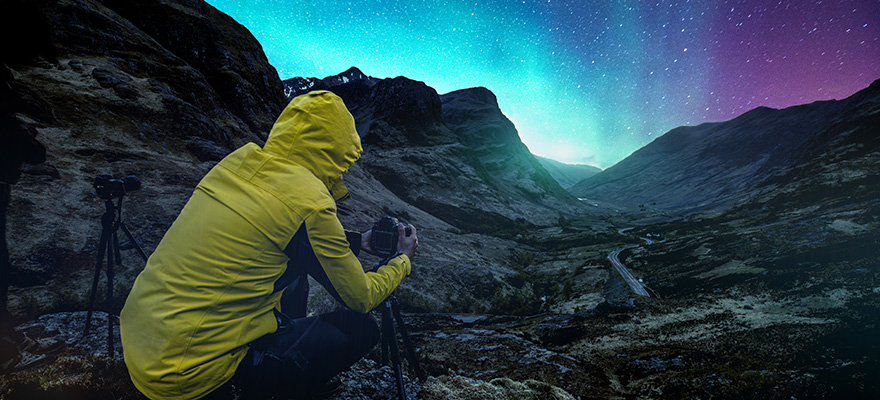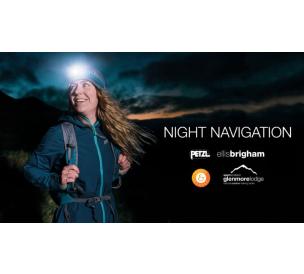Focus on: UK's Dark Sky Reserves

Join Us at one of our Dark Sky Reserves Night Navigation Events.
As light pollution soars and our skies get brighter, Sam Haddad seeks out some protected corners of the UK that still offer fantastic stargazing.
Whether you’re spotting the Plough for the first time, enjoying the W-shaped Cassiopeia constellation or fortunate enough to see the hazy white band of the Milky Way arching overhead, a night sky carpeted in twinkling stars is an awe-inspiring sight.
Our ancestors didn’t need to create specially protected spots to enjoy the spectacle, they simply looked up. But today, skyglow – the brightness of a night sky due to light pollution from streetlights, shopfronts, car parks and countless other human sources – is increasingly thwarting even the most casual of stargazers.
A citizen science study reported in the journal Science found that skyglow had increased by 7-10% in Europe and North America between 2011-22. But as our dark skies diminish, efforts are underway to preserve them. In 2007, Mont Mégantic in Canada was designated the world’s first International Dark Sky Reserve to protect the area’s night skies for “scientific, natural, educational, cultural heritage and/or public enjoyment”.

There are now 21 Dark Sky Reserves around the world, seven of which – including Eryri (Snowdonia), Exmoor, the North Yorkshire Moors, and the South Downs – are in the UK. Meanwhile, Northumberland National Park and the Elan Valley in Wales are two of four Dark Sky Parks (Dark Sky Reserves have dark core zones surrounded by populated peripheries, whereas Dark Sky Parks are natural conservation spaces).
“THERE ARE NOW 21 DARK SKY RESERVES AROUND THE WORLD, SEVEN OF WHICH ARE IN THE UK”
Their status is awarded by the International Dark Sky Association (IDA), the world’s foremost authority on light pollution, based in Tucson, Arizona. Applicants must prove the exceptional quality of their starry nights and nocturnal environment, as well as strong community support – including the take up of dark skyfriendly lighting and educational outreach activities.
Neill Sanders is a keen amateur astronomer who founded Go Stargazing in 2016, a not-for-profit website that showcases stargazing events up and down the country. He’s reluctant to pick a favourite of the UK’s dark sky spots but – if pushed – he would choose the Elan Valley in Wales.

“It has huge reservoirs and Victorian dams,” he explains. “It’s a wonderful place to walk by day, and then at night to see starry skies above these amazing dams [is just] brilliant for photography.”
His key tip before you make any trip is to check the phase of the moon. “If you go to a dark sky site when there is a bright moon in the sky it’s not going to be dark,” he says, adding that the best observing season is once the clocks have gone back in October until they spring forward again in March – providing a great excuse to get out and into nature during the winter months.
You don’t need an expensive telescope, though Sanders advises downloading one of the many mobile stargazing apps, which are cheap and generally reliable. This way you can hold your phone up to the sky and know which stars and constellations you’re seeing. “Even the most remote National Parks tend to have phone signal these days,” he says. He also recommends the free desktop software Stellarium, which lets you put in the date and location of where you’re going to be and previews what’s in the sky so you can plan in advance.

That said, don’t worry too much about identifying constellations early on in your stargazing journey. “Just look up and enjoy it!” says Sanders. “Then if you want to learn more, pick out the bright stars, learn a handful of them and you can work your way up to learning 10 or 12 constellations.”
If you want to see shooting stars, which, Sanders explains, are actually tiny grains of dust that disintegrate into heat and light energy when they come into the atmosphere, they happen all year round, but you stand a bigger chance of seeing one during a meteor shower.
“Look out for the Geminids Meteor Shower at around 2am on Friday 15th December,” he says. “There’s a new moon so the skies will be dark and there could be 80 meteors per hour.”
The UK’s Dark Sky Reserves run educational outreach festivals and events, as do local astronomy societies (there’s even a group that meets in Regent’s Park, London) and observatories. Sanders has noticed a big surge in the popularity of stargazing since the pandemic. “When I first started posting about events seven years ago, there were perhaps 200 across the UK,” he says, “but now it’s more like 6,000.”

For Sanders, getting the public excited about stargazing is a good starting point for having conversations about light pollution. “Where I live in Newcastle, you can see a couple of hundred stars from the city centre,” he explains, “but 30 miles out into the Northumberland Dark Sky Park you can see 2,500 just with the naked eye. That’s why these regions are so important.”
Light creep from towns and cities can be visible for miles around, and homes, industry and farms using the wrong lighting is a big problem. “A farmer might put up a new barn with a couple of bright LED lights angled at 45 degrees. That will illuminate not just the barn but the fields and skies around – and you only need a couple of those to create a light dome.”
“OUR ANCESTORS DIDN’T NEED TO CREATE SPECIALLY PROTECTED SPOTS TO ENJOY THE SPECTACLE – THEY SIMPLY LOOKED UP"
Along with educating the public to limit outdoor light use and point lights downward, Sanders advocates a change in government policy and tighter planning rules around lighting. There are various good reasons – beyond skywatching – to limit light pollution, not least its impact on wildlife – especially bats, bugs, and migratory birds. Our own health can also be negatively affected, since bright skies at night disrupt the body’s circadian rhythm.
But mostly, he admits, he’s all about the stargazing: “I just love encouraging people to get away from their screens and to gaze up at the night sky.”
Find a UK Sky Reserve near you.















